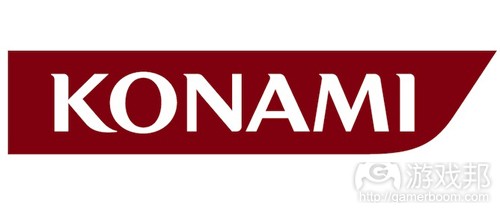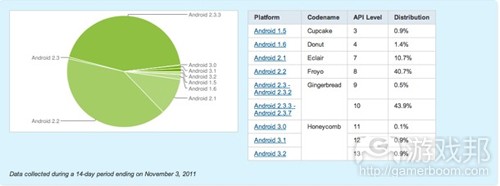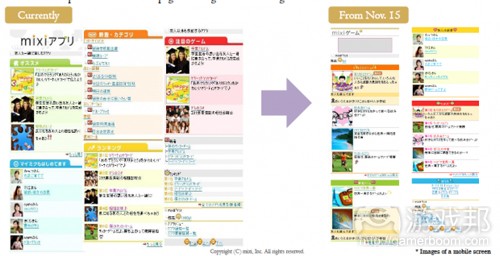每日观察:关注Konami公司2012上半财年报告(11.7)
1)日本游戏发行商Konami最近公布的2012上半财年报告显示,公司社交游戏销售额在这一时期增长了三倍以上。
Konami的数字娱乐部门仍是公司主要销售动力,在该时期创收581亿日元(游戏邦注:约合7.477亿美元,该公司这一时期总销售额约1231亿日元,即15亿美元)。
税后利润为115亿日元(约合1.465亿美元),同比去年的42亿日元增加2倍以上。
由于锁定了社交游戏及数字交易业务,该部门营业利润从去年同期的8.7%增长至26%。尽管消费者游戏业务仍占最大比例销售额,但已从去年同期的267亿日元下降至170亿日元,仅略高于营收达169亿日元的社交游戏业务(其社交游戏营收从去年的6500万美元,增长至今年的2.16亿美元)。
Konami在GREE和Mobage平台的社交游戏注册用户已超过1100万。
2)据serkantoto报道,日本社交游戏公司DeNA收购横滨职业棒球队BayStars一事已成定局,DeNA收将购后者所在俱乐部66.92%的股份(价值为65亿日元,约合8320万美元)。
作为该球队股东之一,DeNA已申请成为日本职业棒球组织(NPB)成员,并计划将该球队重命名为横滨DeNA BayStars(游戏邦注:但据Andriasang报道,NPB不允许DeNA在棒球队中植入自己的品牌名称)。据DeNA所称,公司收购该球队主要有三个目的,一是为日本职业棒球事业做出贡献,并利用Mobage社交游戏平台开展相关创意事业,二是为当地经济发展做贡献,三是加强DeNA在日本的品牌知名度。
3)EA创意总监Richard Hilleman在最近于旧金山举办的新游戏大会上发言表示,HTML5的运行性能是游戏开发者对其望而却步的最大原因。
在他看来,让一款应用流畅运行于不同硬件设备是件极为不可思议的事情,HTML5内容的音效很成问题,他称要让HTML5获得成功,游戏产业必须先为HTML5设立一个技术标准,改善HTML5游戏的发布渠道及盈利方式。
4)谷歌最近发布的Android数据显示,Gingerbread在11月份首次成为用户最普遍采用的Android操作系统,其所占比例从原来的38.2%增长至43.9%,而2.2版本的Frozen Yogurt占有率则从原来的45.3%降至40.7%。
Froyo占有率的下滑趋势进一步加剧,已在两个月内从原来的51.2%降至40.7%。
Éclair占有率为10.7%,Honeycomb仍然不足2%。
观察者称,在操作系统更新这一点上,谷歌或许可向微软取经,后者的Windows Phone 7升至至Mango 7.5版本时,仅用了两周时间就Mango 7.5的占有率达到80%左右。当然,Windows Phone平台分裂现象并不像Android那般严重,Android在全球的移动设备多达270种左右,而Windows Phone的用户比例远逊于Android。另外,Mango操作系统更新的主导权在微软而非移动设备制造商,谷歌在这方面应有所作为。
5)日本社交平台Mixi最近宣布从11月15日起,Mixi将把平台上的应用划分为两大类:游戏及其他应用(游戏邦注:其他应用包括办公应用、算命、自我测试等内容)。
据该公司所称,Mixi还将把游戏划分为不同类型,以方便用户搜索游戏,增加开发商游戏曝光度。(本文为游戏邦/gamerboom.com编译,拒绝任何不保留版权的转载,如需转载请联系:游戏邦)
1) Massive Social Growth Leads Konami To Profitable First Half
by Frank Cifaldi
Japan’s Konami Corporation (Metal Gear, Silent Hill) saw its profits more than double year-on-year in the first half of its fiscal 2012, the company reported Friday.
The growth can be attributed primarily to its social gaming business, which saw sales more than triple during the period.
As always, Konami’s Digital Entertainment segment — its video game publishing arm — was the company’s primary sales driver, contributing 58.1 billion yen ($747.7 million) of a company-wide 123.1 billion yen (around $1.5B), a 6.3 percent increase from the 115.8 billion yen it generated in the same period last year.
Adjusted profits, after taxes, came out to 11.5 billion yen ($146.5 million) for the company, more than double the 4.2 billion yen it reported a year ago.
The Digital Entertainment division’s operating margin nearly tripled from one year ago, from 8.7 percent to 26 percent, due to a focus on social gaming and digital transactions. While its consumer games business still generated the most sales within the division, its 17 billion yen is a significant drop from the 26.7 billion yen a year ago, and only slightly edges out its social gaming revenues, at 16.9 billion yen (versus 5.1 billion one year ago).(source:gamasutra)
First Half Of Fiscal Year: Konami’s Social Gaming-Related Sales Jump From 65 To US$216 Million [Social Games]
by Dr. Serkan Toto
Capcom isn’t the only Japanese video game maker seeing growth in its social games segment: Konami has posted the results for the first half of their current fiscal year (2012), and this is how things look for Konami as a whole:
Sales for social games (SNS games) jumped from 65 to US$216 Million year-on-year. The amazing bullet point here is that this is almost as much Konami makes with consumer games:
Konami also has been seeing a healthy plus in registered users for their social games (over 11 million users, cross-platform: GREE and Mobage):(source:serkantoto)
2)Deal Apparently Goes Through: DeNA Acquires Yokohama BayStars Baseball Team
by Dr. Serkan Toto
DeNA is buying Yokohama-based pro baseball team BayStars, after all. Pending approval (see below), the Mobage company will acauire a 66.92% Yokohama BayStars Baseball Club, Inc. for 6.5 billion yen (US$83.2 mllion).
DeNA’s global PR office has sent the following (unofficial) summary of the Japanese-only press release in English to me:
- DeNA Co., Ltd. announced today its intent to acquire a 66.92% stake in Yokohama BayStars Baseball Club, Inc., which operates Yokohama BayStars professional baseball team in Japan’s Central League, for 6.5 billion Japanese yen.
- Tokyo Broadcasting System Holdings, INC. (TBS Holdings) and BS-TBS, INC., two of the current sharedholders of Yokohama BayStars Baseball Club, and DeNA have signed the stock purchase agreement today. The stock purchase is pending approvals from the Nippon Professional Baseball Organization (NPB) and owners of other baseball teams.
- DeNA also applied for an NPB membership today. DeNA plans to rename the baseball team as Yokohama DeNA BayStars. DeNA will pay 3.0 billion Japanese yen to NPB as a required deposit.
- DeNA has mainly three purposes for the planned acquisition:
1. Contribution to Japan’s professional baseball scene and consequent
creation of synergies with DeNA’s Mobage social gaming business
2. Contribution to the local community
3. Enhancement of DeNA’s brand in Japan
- TBS Holdings will retain a 2.31% share in Yokohama BayStars.(source:serkantoto) http://www.serkantoto.com/2011/11/04/deal-yokohama-baystars-baseball/
3)Hilleman: HTML5 Will Need to Improve to Survive – EA’s creative director Richard Hilleman has revealed that HTML5’s performance issues have proven to be major hurdle for game developers. According to Gamasutra, who attended the presentation at the New Game Conference in San Francisco, Hilleman said it was difficult to predict how an app would run different hardware specifications, and that HTML5’s audio issues will need to be addressed. Hilleman encouraged the industry to set technical standards for the platform and improve how games using HTML5 are distributed and monetized if the platform is to ultimately be successful.(source:insidesocialgames)
4)Gingerbread Finally Overtakes Froyo for Most Used Android Flavor
By Dan Rowinski
Google has released the latest Android fragmentation numbers for November and for the first time ever Gingerbread is the most used version of the Android platform. Gingerbread versions starting at 2.3.3 rose 5.7% from 38.2% to 43.9% of all Android devices while version 2.2 Frozen Yogurt fell 4.6% from 45.3% to 40.7%.
The decline of Froyo is accelerating, having gone from 51.2% of all Android devices to its current level in two months. In that same time frame, Gingerbread has risen 13.1%. The major Android OEMs are not shipping new devices with Froyo anymore which should further accelerate the adoption of Gingerbread especially with the holiday shopping season and the new devices that are being released that are sure to have large marketing campaigns until the end of the year.
It will be interesting to see how long Froyo hangs to a significant percentage of the Android ecosystem. Froyo was really when Android starting taking off and is one of the biggest jumps that the platform has taken in its history. Ice Cream Sandwich is the next biggest jump and will begin phasing out Gingerbread next year. There will likely always be three flavors of Android with double-digit representation in the ecosystem, as Éclair is still holding on to nearly one in every 10 Android devices with 10.7% (down from 11.7% last year).
Honeycomb did not make any appreciable gains in the last month, staying at less than 2% among its three API levels. The only difference is that Android 3.0 went down from 0.2% while version 3.2 went up to 0.9%. That is most likely due to updates as opposed to sales of new devices. Android tablet sales have been better in the latter half of 2011 but the explosive growth of Android smartphones keeps the Honeycomb percentage low of overall devices in the ecosystem.
Heading into 2012, we are likely to start seeing a major split between Ice Cream Sandwich and the older versions of Android. Many OEMs are not going to upgrade older devices to Gingerbread, let alone the logistical jumps that are needed to institute Ice Cream Sandwich. Most devices that launched with Gingerbread will likely see an expedited upgrade cycle but that is still going to be a cycle that takes months as opposed to weeks.
Google and the Open Handset Alliance could learn something from the way Microsoft handled the Windows Phone 7 upgrade from the original version to Mango 7.5. It was a graduated rollout over a month where most (80% supposedly) saw the upgrade within the first two weeks. Granted, it is much easier for Microsoft to do a coordinated rollout of Windows Phone updates because there is much less device fragmentation in that ecosystem and millions upon millions less devices in the market. There are upwards of 270 Android unique Android devices worldwide where Windows Phone only has a handful that are being used by a small percentage of people. At the same time, the Mango update originated from Microsoft, not the OEMs. Google could be more proactive in its role as the proprietor of Android and issue updates centrally as opposed to leaving it up to the agreements between the OEMs and carriers. (source:readwriteweb)
5)Mixi Revamps Its App Platform [Social Networks]
by Dr. Serkan Toto
In their latest financial report, Mixi didn’t only report numbers but also announced a major overhaul of its app platform for November 15. It’s the most radical revamp of that section ever and is likely to benefit social game makers.
The basic idea is to split the apps section into two parts: games and other apps (i.e. utility apps, fortune-telling, self-tests, etc.). Mixi’s goal here is simplify navigation for users – which is a good move, given the current situation (it actually is very hard to look for apps of interest).
Mixi says they will have different categories for games, better search, and a link on the homepage that directly leads to games (instead of apps in general, as is the case now).(source:serkantoto)












































 闽公网安备35020302001549号
闽公网安备35020302001549号